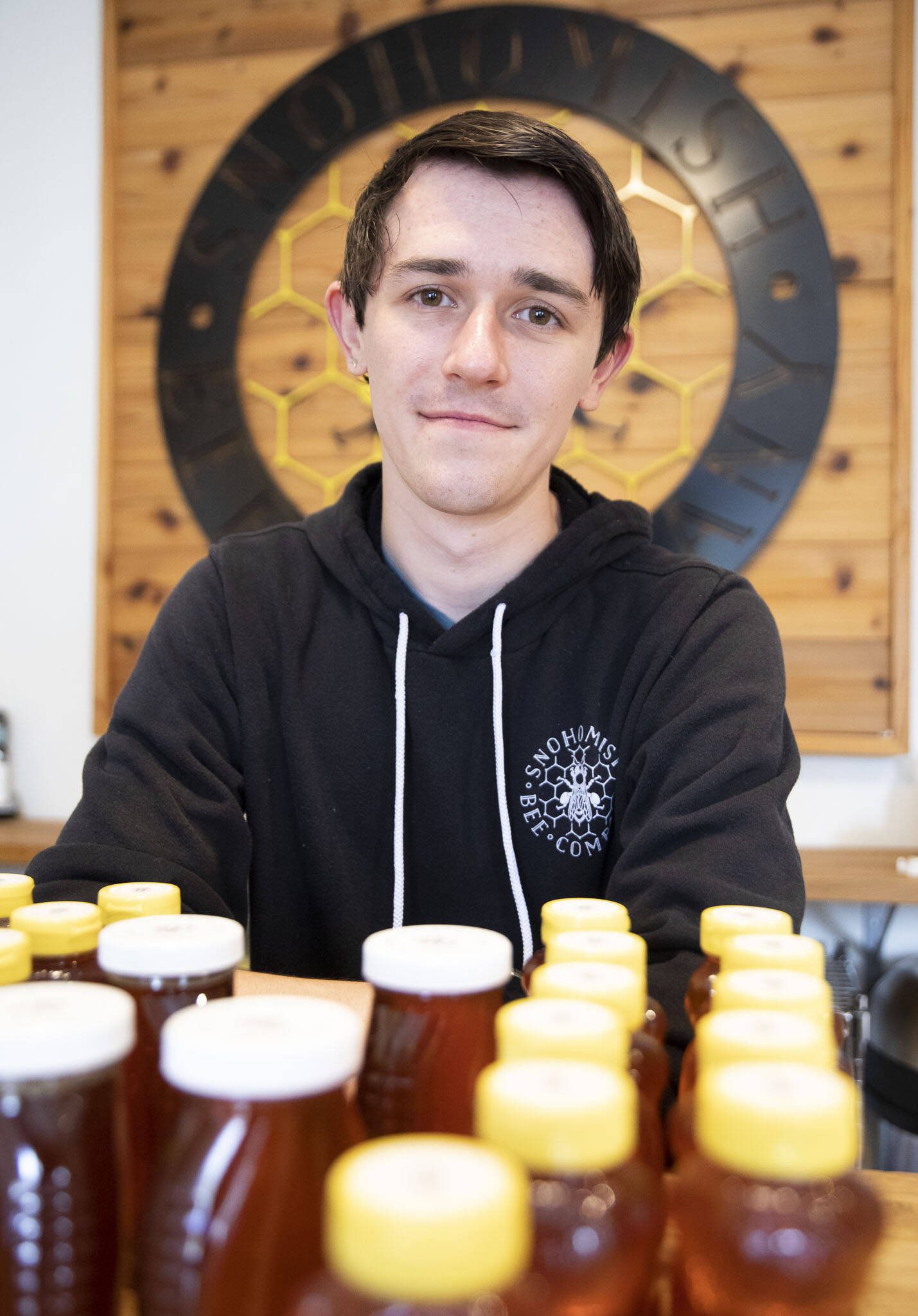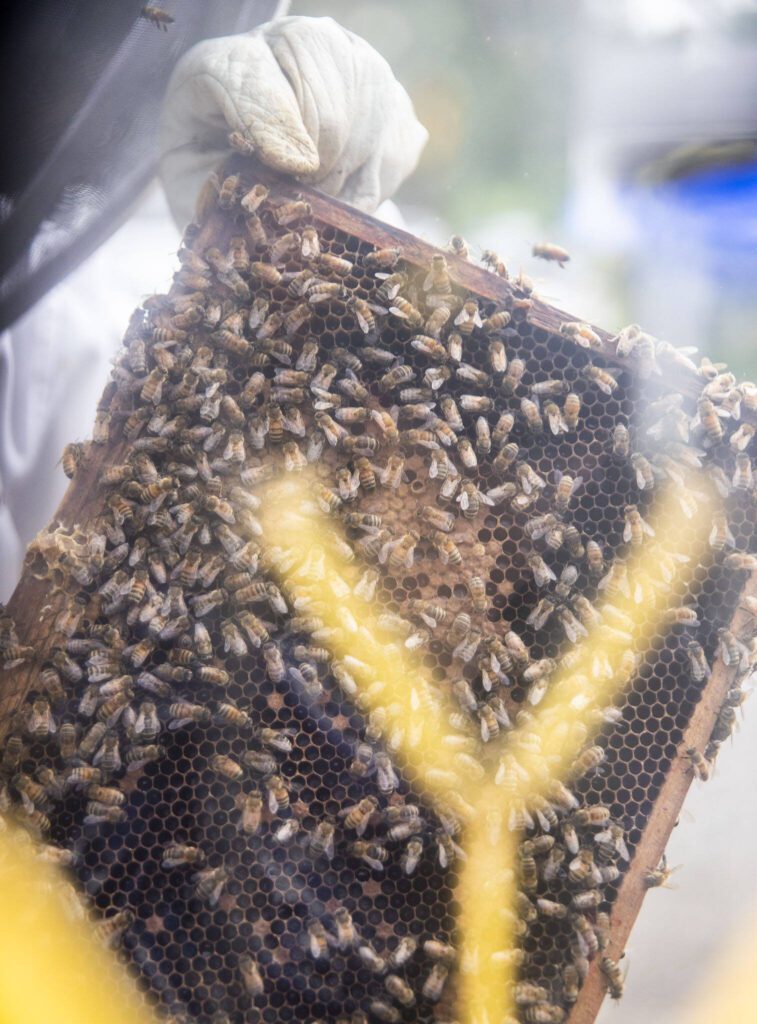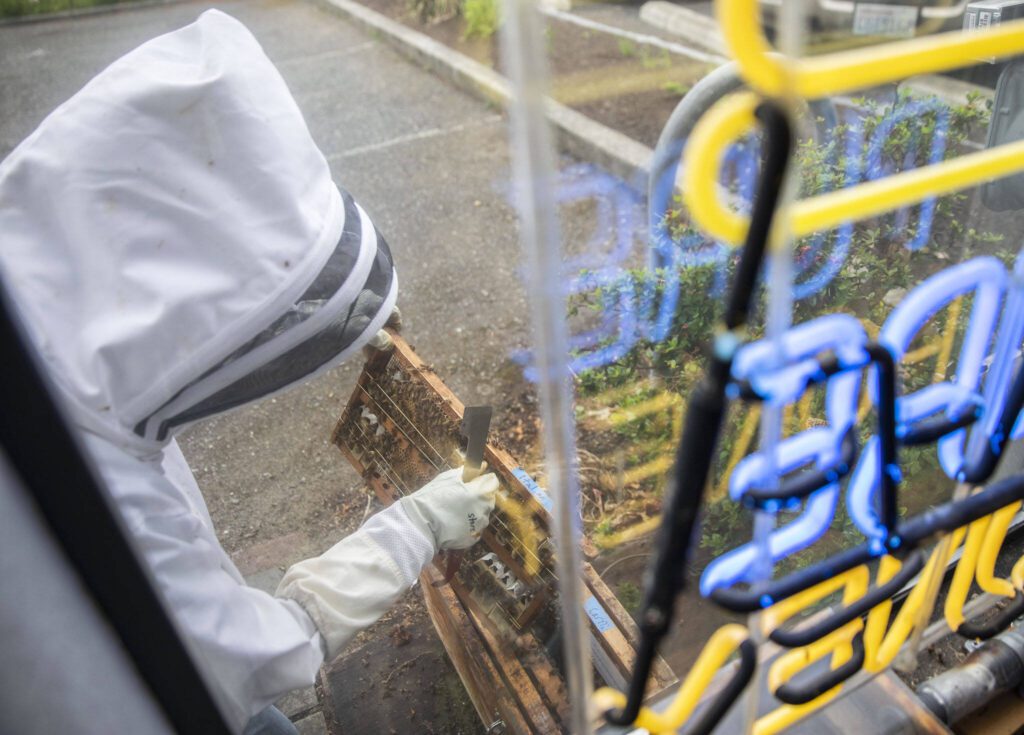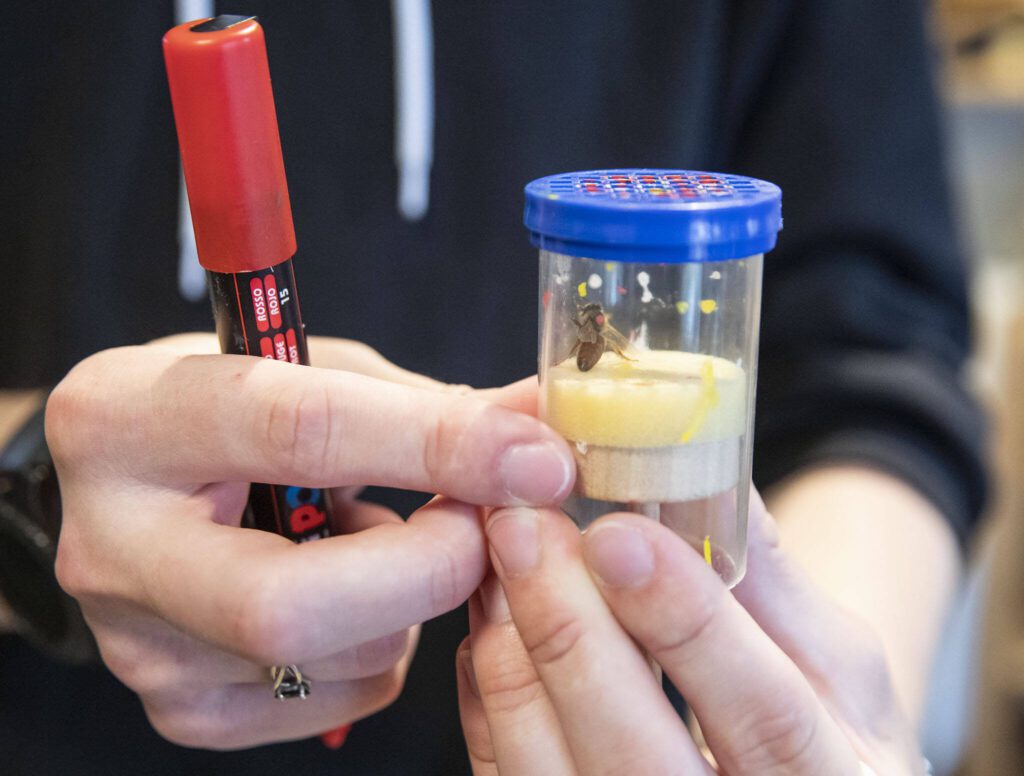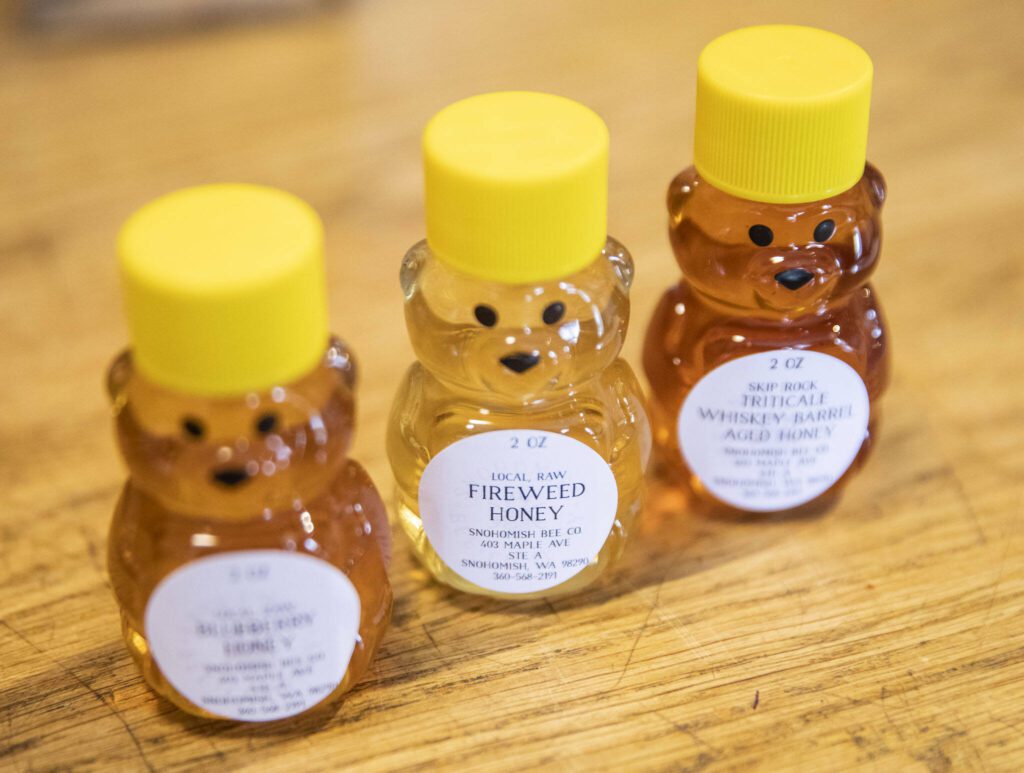SNOHOMISH — Scott Douglas, a new beekeeper in Winlock, Washington, wasn’t getting the answers he needed from a local bee supplier.
In the market for a 3 pound package of Italian honeybees, he had questions about cost and availability.
But the supplier was grumpy on the phone and never replied to a follow-up email, Douglas said.
Douglas, a retired Washington State Patrol trooper, is used to stinging rebukes, but not liking “to work to give someone my money,” he searched elsewhere.
From his home in southwest Washington, he located the Snohomish Bee Company on the web and got his questions answered right away.
A few weeks later, Douglas traveled three hours north, and picked up 10,000 bees in a secure, shoe-box size cage from Brandon Wight.
“They’re really nice people and they’re all about customer service,” Douglas said of the bee company.
(Full disclosure: this reporter recently donned a protective bee suit and helped Douglas inspect the hive.)
Wight is the new co-owner of the Snohomish Bee Company at 403 Maple Ave., Studio A, in Snohomish.
He and business partner, Melissa Faries, bought the bee supply company in January from Cory and Sarah Marchand.
It was a sweet homecoming for the 23-year-old Wight.
The Snohomish Bee Company gave him his first job when he was 18. Now, he was taking over the same business.
Wight’s knowledge of bees — he’s been a beekeeper since he was 17 — and his willingness to help customers caught the owners’ attention from the get-go.
“He’s very patient and open-minded. Hardworking,” Cory Marchand told The Daily Herald in 2019.
Acquiring the company was a bit of a waggle (much like bees do a “waggle dance” to help their brethren locate the good buds).
Obtaining a business loan took some convincing. For one thing, Wight’s age raised eyebrows.
But Faries’ good credit record, she owns La Bella Bean Espresso in Bothell, and support from Wight’s uncle, Aaron Wight, helped them secure a loan from SaviBank, based in Freeland, Washington, he said.
April and May are the busiest months, Wight said.
That’s when beekeepers, in need of fresh stock, pick up their orders.
Fortunately, Wight was prepared for the swarm.
Earlier in the year, he and Faries picked up eight pallets of bees from the company’s longtime California supplier. That’s about 6 million of the honey-producing superstars, he said.
Next year, they hopes to triple the haul to 20 million bees.
When the bees arrived in years past, the line of customers that formed outside the small storefront at in Snohomish resembled a crowd of Taylor Swift concertgoers.
Due to the crush, the bee company now distributes its bee packs at the Evergreen State Fairgrounds in Monroe, giving customers more space.
A 1-pound package, containing about 3,000 Italian bees, can cost $180. Queens start at $45 each.
(Known for their mellow disposition, Italian bees are among the most popular species in North America. Other varieties include the hearty Russian honey bee and and Carniolan honey bees, which can thrive in colder climes. )
Besides bees, the store sells hives, beekeeping clothes, hive tools, honey bee feed and clothing, candles and honey.
“It’s raw, unfiltered honey,” said Faries, also a beekeeper. “The bees are amazing. the more I’m learning about honey and its health benefits is amazing.”
Wight teaches beekeeping classes and sits on the board of the Washington State Beekeepers Association.
New beekeepers should expect to invest about $1,500 in a hive, Wight said.
Don’t expect a honey crop the first year, he said. With good care, however, you can expect a yield of 2 to 5 gallons in the second year, Wight said.
Bees are responsible for pollinating about a third of the world’s food supply.
In the United States, honey bees provide pollination services valued at $15 billion to $20 billion annually, according to Reed Johnson, a researcher in Ohio State University’s Department of Entomology.
But bee populations in the U.S. are declining.
Since 2006, commercial beekeepers have reported losing a third of their honey bee colonies each winter — “startling, when compared to historical loss rates of 10 to 15 percent,” the Ohio university report said.
Pesticides, parasites and climate change are possible factors in their demise, experts say.
Hobbyists and small scale beekeepers can help the environment by tending a hive or two. Plus, their efforts help educate the public about the critical role bees and other pollinators play, according to the state’s bee association.
When the folks at Harvey Field in Snohomish discovered a cluster of unhoused bees at the airport, they called Wight who donned a protective bee suit and collected the swarm. He gets about 50 to 100 calls a year to collect wayward bees, he said.
Bees swarm when the hive population swells. In response, the queen leaves the colony, taking half the bees with her.
The remaining workers select a baby bee among the brood and feed it exclusively on royal jelly, a milky secretion made by workers. The jelly super-sizes the little bee and turns her into an egg-laying machine, able to lay up to 3,000 eggs a day.
Cool Bees
There’s lots of cool things to know about bees.
Honey bees aren’t native to North America, but were introduced here in the early 1600s.
About 85% are workers, females that can’t reproduce. The remainder are drones, whose only job is to mate with the queen (Once they do, bye, they die).
And just like the British monarchy, there’s an agreed-upon protocol when it comes to the queen.
Take your time introducing a new queen to the hive. Wait at least 24 hours, Wight said.
If you’re a new beekeeper, consider a “marked” queen, one that’s been dotted with a drop of paint. It makes her easier to identify, he said.
Ordered a new queen? She’ll be housed separately in a cage a little bigger than a pack of gum, accompanied by a retinue of five 0r 10 nurse bees.
If you can’t pick up a queen in person, Wight can ship her UPS or U.S. Postal Service.
To ensure the new queen is accepted by the colony, plug the entrance to her cage — a tiny hole —with a marshmallow, and place the cage inside the hive, Wight said.
In a day or two, the bees will eat through the treat and release her. In the meantime they’ll become familiar with her.
The queen rules the hive with the pheromones she emits, chemical messengers that help her communicate with the hive.
Since she can’t feed herself, she relies on young workers, known as nurse bees, to feed and groom her.
It’s a nice job until her productivity lags.
When that happens, the worker bees surround her and violently vibrate their wings, which generates so much heat it suffocates her.
To make sure the queen is dead, they also bite and sting her.
In Winlock, Douglas’ hive of Snohomish Bee Supply honey bees is flourishing.
They’re going “gangbusters,” flitting from the wildflowers to the blackberry, dandelions and blossoms in the backyard, he said.
“I expect to get about 30 pounds of honey (about 3 gallons) this year,” Douglas said.
For more information, go to snohobeeco.com
Janice Podsada: 425-339-3097; jpodsada@heraldnet.com;
Talk to us
> Give us your news tips.
> Send us a letter to the editor.
> More Herald contact information.
